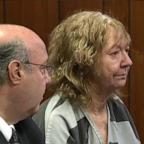Former Navy SEAL Chris Kyle's Killing Puts Spotlight on PTSD
The former Navy SEAL was shot while helping a fellow veteran.
Feb. 3, 2013— -- The shooting death of former Navy SEAL Chris Kyle, an advocate for veterans' mental health, has pushed the problem of post-traumatic stress disorder among American troops to the fore.
Kyle, who was known as America's deadliest sniper, was killed Saturday at a gun range in Erath County, Texas. The suspect, identified by police as 25-year-old Eddie Ray Routh, is a veteran who served in Iraq and Haiti and who police say may have been suffering from some type of mental illness from being in the military.
A second man, identified by police as 35-year-old Chad Littlefield, was also shot at point-blank range and killed. Kyle and Littlefield had taken Routh to the shooting range to aid his recovery, police said.
"My heart is breaking," Travis Cox, director of FITCO Cares, the non-profit foundation Kyle co-founded to help ease veterans back into civilian life, said in a statement. "Chris died doing what he filled his heart with passion -- serving soldiers struggling with the fight to overcome PTSD. His service, life and premature death will never be in vain."
Routh will be charged with two counts of capital murder, police said today.
While the details of Routh's mental health are unclear, up to 20 percent of soldiers returning from Iraq and Afghanistan suffer from PTSD, according to a 2008 RAND study.
"The symptoms can range from mildly disturbing to wholly incapacitating," said Dr. Jeffrey Lieberman, chair of psychiatry at Columbia University Medical Center in New York City and president elect of the American Psychiatric Association, describing the nightmares and flashbacks that can haunt soldiers long after their return to civilian life. "And we're still limited in our understanding of why it occurs, what it consists of and the best approaches to treatment."
One treatment approach involves the slow, steady, re-exposure of patients to their PTSD triggers, according to George Everly, associate professor of psychiatry at Johns Hopkins Bloomberg School of Public Health in Baltimore.
"It makes sense, in a way, re-exposing people to the thing they fear of in small doses, almost like an inoculation so the body says, 'this is uncomfortable, but I can handle it,'" Everly said. "Under proper, controlled conditions, re-exposure therapy is certainly one of the most popular treatments for PTSD when done by a professional."
Although Kyle was known to take veterans battling PTSD to the shooting range, it's unclear whether Routh suffered from the disorder and whether the activity was intended to expose him to any PSTD triggers, such as gunfire.
"Kind of have an idea that maybe that's why they were at the range, for some type of therapy that Mr. Kyle assists people with," Erath County Sheriff Tommy Bryant told reporters today. "I don't know if it's called shooting therapy, I don't have any idea but that's what little bit of information that we can gather so far."
The shooting is the latest in a string of tragedies stirring debates around gun control and mental health. But Lieberman said the mentally ill "do not contribute substantially to the overall rates of gun violence in this country."
"People with mental illness tend to be overrepresented in these sorts of tragedies largely because their symptoms have gone untreated -- they lack access to care or they lack insight to the fact they need care," he said.






